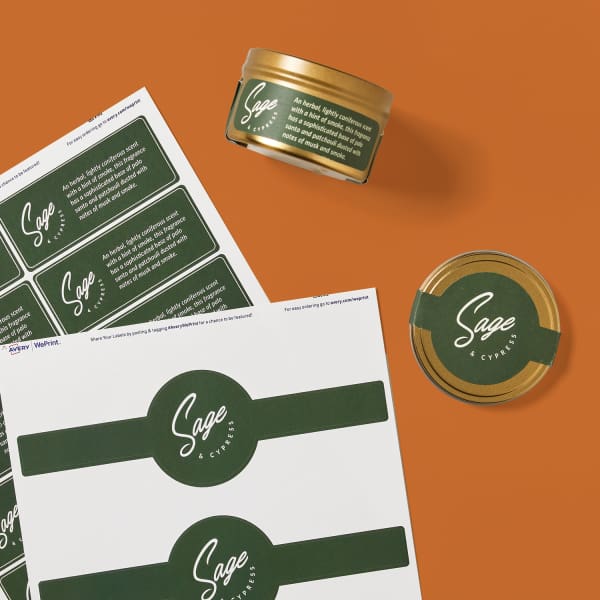Everything About Blank Labels: The Ultimate Solution for Your Customized Labeling Requirements
In the realm of customized labeling, blank labels stand out as a remarkably versatile solution that caters to a large selection of company requirements. From product recognition to compliance-driven applications in numerous industries, these unmarked glue materials give an adaptable canvas for creativity and feature. With a considerable choice of products, shapes, and sizes available, companies can customize their labeling methods to enhance both brand identification and functional efficiency. However, the real possibility of blank labels usually goes unknown. What factors to consider should one keep in mind when discovering this adjustable option?
Recognizing Blank Labels
What do we indicate by blank labels, and why are they substantial in various contexts? Blank tags are unprinted glue materials that can be personalized for a selection of applications across different sectors.
The capacity to publish on blank labels permits customized solutions that meet certain demands. Businesses can utilize them for identifying items with one-of-a-kind barcodes, ingredients, or expiration dates, making certain conformity with regulations and improving traceability. In retail, blank labels can assist in vibrant rates strategies, permitting easy updates as market conditions alter.
Additionally, empty tags are crucial for people that call for tailored solutions for home organization, event preparation, or do it yourself tasks - Blank Labels. The ease of printing as needed empowers users to create tags that mirror their details needs, advertising performance and quality. On the whole, recognizing empty labels highlights their significance in helping with effective communication and company throughout varied applications
Kinds Of Blank Labels
Categorizing empty tags exposes a diverse range of options customized to satisfy different needs throughout numerous markets. These labels come in numerous products, shapes, sizes, and glue kinds, permitting a customized approach to labeling.
First, the product utilized for blank tags can consist of paper, vinyl, polyester, and even textile, each offering certain benefits such as resilience, weather resistance, or eco-friendliness (Blank Labels). Paper tags are commonly used for interior applications, while plastic and polyester are better matched for outside or high-moisture environments
In regards to shape and dimension, blank tags are offered in basic layouts like rectangular shapes and circles, as well as personalized shapes to fit one-of-a-kind requirements. This flexibility improves their applicability across various markets, from retail to production.
Adhesive kinds additionally differ, with alternatives including permanent, detachable, and repositionable adhesives. Long-term adhesives give a strong bond for lasting use, while removable options enable for very easy application and elimination without leaving deposit. Repositionable tags offer flexibility for changes during the labeling procedure.
Applications and Makes Use Of

In the healthcare area, empty labels are crucial for classifying medicines, specimen containers, and clinical devices, ensuring conformity with security and regulatory criteria. Likewise, educational establishments use blank tags for organizing class materials, pupil projects, and occasion signage, cultivating an arranged discovering environment.
Additionally, in the food and drink market, empty labels make it possible for companies to give vital details concerning active ingredients, nutritional truths, and expiry dates, making sure openness and compliance with food security regulations. Craft and pastime fields gain from blank tags too, allowing people to individualize products or produce customized gifts.
Advantages of Custom Labels
Customized tags supply considerable benefits that boost branding, interaction, and efficiency across numerous applications. By allowing companies to customize their tags, personalized alternatives foster a distinct brand identity that sticks out in a congested market. This distinction is critical for attracting customers and developing brand loyalty.

On top of that, custom tags enhance functional efficiency. By making use of empty labels that can be published on-demand, companies can promptly adapt to transforming inventory, seasonal promotions, or governing requirements. This versatility decreases waste and decreases expenses related to overproduction or stockpiling out-of-date tags.
Furthermore, the capacity to create tags in numerous shapes, sizes, and materials makes sure that they fulfill certain application demands, whether for product packaging, delivery, or company. Ultimately, the benefits of custom labels not click reference just improve brand name exposure yet also streamline processes and boost general customer experience, making them a vital device for any kind of business.
Tips for Designing Labels
When starting the design of labels, consider the importance of clarity and visual appeal to effectively communicate your brand's message. Beginning by picking an ideal format that straightens with your item's dimensions and target audience. A balanced design ensures that essential details is noticeable without frustrating the customer.
Following, select a site color palette that mirrors your brand name identity. Colors stimulate emotions and can considerably influence customer habits. Lively colors might draw in attention, while low-key tones might communicate beauty. Make certain that your message contrasts well with the background for very easy readability.
Typography likewise plays an important duty in label style. Select fonts that are understandable and resonate with your brand name's personality. Limitation the variety of different font styles to maintain a cohesive appearance.
Incorporate top notch images or graphics that improve your item's appeal. Guarantee that these visuals are pertinent and professional, as they can make or damage the tag's effectiveness.
Final Thought
In conclusion, blank tags offer as a functional and reliable remedy for a myriad of classifying demands throughout numerous markets. By using diverse materials, shapes, and adhesive kinds, organizations can develop tailored labels that satisfy particular requirements.